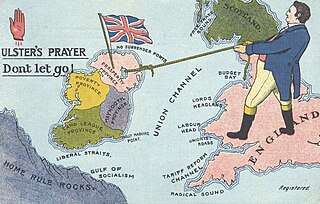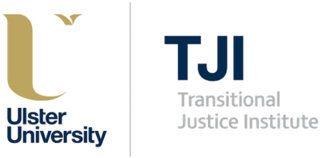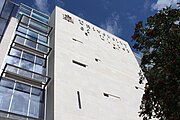
Belfast is the capital city and principal port of Northern Ireland, standing on the banks of the River Lagan and connected to the open sea through Belfast Lough and the North Channel. It is the second-largest city on the island of Ireland, with an estimated population of 348,005 in 2022, and a metropolitan area population of 671,559.

Northern Ireland is a part of the United Kingdom in the north-east of the island of Ireland that is variously described as a country, province or region. Northern Ireland shares an open border to the south and west with the Republic of Ireland. At the 2021 census, its population was 1,903,175, making up around 3% of the UK's population and 27% of the population on the island of Ireland. The Northern Ireland Assembly, established by the Northern Ireland Act 1998, holds responsibility for a range of devolved policy matters, while other areas are reserved for the UK Government. The government of Northern Ireland cooperates with the government of Ireland in several areas under the terms of the Belfast Agreement. The Republic of Ireland also has a consultative role on non-devolved governmental matters through the British–Irish Governmental Conference (BIIG).

The Troubles were an ethno-nationalist conflict in Northern Ireland that lasted for about 30 years from the late 1960s to 1998. Also known internationally as the Northern Ireland conflict, it is sometimes described as an "irregular war" or "low-level war". The conflict began in the late 1960s and is usually deemed to have ended with the Good Friday Agreement of 1998. Although the Troubles mostly took place in Northern Ireland, at times violence spilled over into parts of the Republic of Ireland, England, and mainland Europe.
The Social Democratic and Labour Party is a social-democratic and Irish nationalist political party in Northern Ireland. The SDLP currently has seven members in the Northern Ireland Assembly (MLAs) and two members of Parliament (MPs) in the House of Commons of the United Kingdom.

The Ulster Defence Association (UDA) is an Ulster loyalist paramilitary group in Northern Ireland. It was formed in September 1971 as an umbrella group for various loyalist groups and undertook an armed campaign of almost 24 years as one of the participants of the Troubles. Its declared goal was to defend Ulster Protestant loyalist areas and to combat Irish republicanism, particularly the Provisional Irish Republican Army (IRA). In the 1970s, uniformed UDA members openly patrolled these areas armed with batons and held large marches and rallies. Within the UDA was a group tasked with launching paramilitary attacks that used the cover name Ulster Freedom Fighters (UFF) so that the UDA would not be outlawed. The British government proscribed the UFF as a terrorist group in November 1973, but the UDA itself was not proscribed until August 1992.

Unionism in Ireland is a political tradition that professes loyalty to the crown of the United Kingdom and to the union it represents with England, Scotland and Wales. The overwhelming sentiment of Ireland's Protestant minority, unionism mobilised in the decades following Catholic Emancipation in 1829 to oppose restoration of a separate Irish parliament. Since Partition in 1921, as Ulster unionism its goal has been to retain Northern Ireland as a devolved region within the United Kingdom and to resist the prospect of an all-Ireland republic. Within the framework of the 1998 Belfast Agreement, which concluded three decades of political violence, unionists have shared office with Irish nationalists in a reformed Northern Ireland Assembly. As of February 2024, they no longer do so as the larger faction: they serve in an executive with an Irish republican First Minister.
The Alliance Party of Northern Ireland, or simply Alliance, is a liberal and centrist political party in Northern Ireland. Following the 2022 Northern Ireland Assembly election, it was the third-largest party in the Northern Ireland Assembly, holding seventeen seats, and broke through by placing third in first preference votes in the 2019 European Parliament election and polling third-highest regionally at the 2019 UK general election. The party won one of the three Northern Ireland seats in the European Parliament, and one seat, North Down, in the House of Commons, the lower house of the Parliament of the United Kingdom.

The Ulster Democratic Party (UDP) was a small loyalist political party in Northern Ireland. It was established in June 1981 as the Ulster Loyalist Democratic Party by the Ulster Defence Association (UDA), to replace the New Ulster Political Research Group. The UDP name had previously been used in the 1930s by an unrelated party, which on one occasion contested Belfast Central.

Ulster University, legally the University of Ulster, is a multi-campus public research university located in Northern Ireland. It is often referred to informally and unofficially as Ulster, or by the abbreviation UU. It is the largest university in Northern Ireland and the second-largest university on the island of Ireland, after the federal National University of Ireland.

The Vanguard Unionist Progressive Party (VUPP), informally known as Ulster Vanguard, was a unionist political party which existed in Northern Ireland between 1972 and 1978. Led by William Craig, the party emerged from a split in the Ulster Unionist Party (UUP) and was closely affiliated with several loyalist paramilitary groups. The party was set up in opposition to power sharing with Irish nationalist parties. It opposed the Sunningdale Agreement and was involved in extra-parliamentary activity against the agreement. However, in 1975, during discussions on the constitutional status of Northern Ireland in the constitutional convention, William Craig suggested the possibility of voluntary power sharing with the nationalist Social Democratic and Labour Party. In consequence the party split, with dissenters forming the United Ulster Unionist Party. Thereafter Vanguard declined and following poor results in the 1977 local government elections, Craig merged the remainder of Vanguard into the UUP in February 1978.

The Battle of the Bogside was a large three-day riot that took place from 12 to 14 August 1969 in Derry, Northern Ireland. Thousands of Catholic/Irish nationalist residents of the Bogside district, organised under the Derry Citizens' Defence Association, clashed with the Royal Ulster Constabulary (RUC) and loyalists. It sparked widespread violence elsewhere in Northern Ireland, led to the deployment of British troops, and is often seen as the beginning of the thirty-year conflict known as the Troubles.
The Northern Ireland Civil Rights Association (NICRA) (Irish: Cumann Cearta Sibhialta Thuaisceart Éireann) was an organisation that campaigned for civil rights in Northern Ireland during the late 1960s and early 1970s. Formed in Belfast on 9 April 1967, the civil rights campaign attempted to achieve reform by publicising, documenting, and lobbying for an end to discrimination against Catholics in areas such as elections (which were subject to gerrymandering and property requirements), discrimination in employment, in public housing and abuses of the Special Powers Act.
Kennedy Lindsay (1924–1997) was a Northern Ireland politician and a leading advocate of Ulster nationalism. Born in Canada but raised in Northern Ireland, Lindsay pursued a career as a history academic before becoming associated with the Ulster Vanguard tendency of unionism. He took a leading role in the tendency within the Vanguard that supported a diminished role for the United Kingdom in Northern Ireland and produced the Dominion of Ulster, outlining his views, in 1972.

Monica Mary McWilliams is a Northern Irish academic, peace activist, human rights defender and former politician.

CAIN is a database containing information about conflict and politics in Northern Ireland from 1968 to the present. The project began in 1996, with the website launching in 1997. The project is based within Ulster University at its Magee campus. The archive chronicles important events during the Troubles, stretching from 1968 until the present day. The name is an allusion to the Biblical Cain, who murdered his brother Abel.
The Troubles were a period of conflict in Northern Ireland involving republican and loyalist paramilitaries, the British security forces and civilians. They are usually dated from the late 1960s to the Good Friday Agreement of 1998. However, sporadic violence has occurred since that time, with those involved often being referred to as "dissident republicans and loyalists". The Troubles, sometimes known internationally as the Northern Ireland conflict, claimed roughly 3500 lives.

The Traditional Unionist Voice (TUV) is a unionist political party in Northern Ireland. In common with all other Northern Irish unionist parties, the TUV's political programme has as its sine qua non the preservation of Northern Ireland's place within the United Kingdom. A founding precept of the party is that "nothing which is morally wrong can be politically right".
The Ulster Unionist Party held the majority of Northern Ireland seats in most elections for the Westminster Parliament between 1922 and 2001. Since then its representation has been low or non-existent, having been eclipsed by the Democratic Unionist Party. It always had an absolute majority in the Stormont Parliament (1921–1972); since that Parliament was replaced by the Northern Ireland Assembly it has had a substantial minority representation there. Its share of the vote in Northern Ireland local government elections has tended to diminish, so that there too it is no longer the largest party. Finally, the party has always held one of the three Northern Ireland seats in the European Parliament. Its share of the Northern Ireland vote in the most recent elections to these bodies has been between 10.5% and 16.1%.

The Ulster University's Transitional Justice Institute (TJI), is a law-led multidisciplinary research institute of Ulster University which is physically located at the Jordanstown, and Magee campuses. It was created in 2003, making it the first and longest-established university research centre on this theme. In the 2014 Research Excellence Framework (REF) Law at Ulster University was ranked 4th overall in the UK. Ulster was ranked first for impact in law with 100% of impact rated as world-leading, the only University to achieve this in law.














